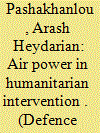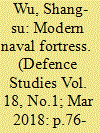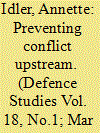|
|
|
Sort Order |
|
|
|
Items / Page
|
|
|
|
|
|
|
| Srl | Item |
| 1 |
ID:
157988


|
|
|
|
|
| Summary/Abstract |
It would be hard to overstate the importance of air power in humanitarian intervention (HI) and the Responsibility to Protect (R2P). Yet, the role of air power in HI and R2P has been understudied. This article seeks to remedy the lack of systematic investigation. It does so by developing a framework for assessing the effectiveness of air power during military operations in HI and R2P and applies it to NATO’s air campaigns in Kosovo (Operation Allied Force) and Libya (Operation Unified Protector). Upon examination NATO is revealed to have fared better in Libya than Kosovo in positively accomplishing its stated humanitarian objectives, minimizing collateral damage and reducing the costs for the interveners, all of which are aspects considered by the model. The relative effectiveness of Operations Unified Protector is generally attributed to geography, diplomacy and technology. It is argued that better ground support, unmanned aerial vehicles (UAVs) and burden sharing are needed to enhance the utility of air power in HI and R2P even further.
|
|
|
|
|
|
|
|
|
|
|
|
|
|
|
|
| 2 |
ID:
157985


|
|
|
|
|
| Summary/Abstract |
How do we understand combat effectiveness – soldiers’ performance in battle? Despite the broad consensus that understanding combat effectiveness is important both for scholars and policymakers, there is widespread disagreement about what combat effectiveness is. More specifically, studies of effectiveness tend to focus on either the skill of soldiers in battle, or their will to fight. Yet both skill and will are essential components of an effective fighting force. This article argues that understanding combat effectiveness requires understanding both of these key components of effectiveness. In other words, combat effectiveness requires both the skill and will to engage the enemy in an organized manner. It then demonstrates the usefulness of this conceptualization by applying it to the cases of British, Indian, and Australian forces fighting the Japanese during the Second World War. Only when scholars are talking about the same concept will our understanding of the conditions under which militaries are effective in battle progress. By comparing different units fighting the same opponent under the same material conditions, I demonstrate that units vary both in their combat skill and their will to fight, and that understanding their effectiveness in battle requires analyzing both of these key factors.
|
|
|
|
|
|
|
|
|
|
|
|
|
|
|
|
| 3 |
ID:
157992


|
|
|
|
|
| Summary/Abstract |
The modern Mission Command philosophy in military operations originated with the German concept of Auftragstaktik (mission tactics). It emphasizes in general terms the exercise of disciplined initiatives by subordinates during the execution of mission-type orders in the course of military operations that are conducted within the overall intent of a commander. The present paper contains an overview of the historical evolution of the mission command concept and its application. The paper compares the mission command concept with the detailed or linear method of command. This paper focuses on the relevance of the mission command concept for the Hellenic Land Forces (HLF) in Greece. The paper provides a historical account on when and where mission command was successfully exercised by the Hellenic Armed Forces in the modern military history of Greece. The authors support the premise that the mission command concept is essential for safeguarding Greek national security in the current environment of evolving symmetric and asymmetric threats, and in meeting operational challenges in a diverse and difficult terrain. The paper examines the cultural reasons that have impeded the adoption of the mission command concept within the HLF and recommends a three-phase model for its permanent implementation.
|
|
|
|
|
|
|
|
|
|
|
|
|
|
|
|
| 4 |
ID:
157990


|
|
|
|
|
| Summary/Abstract |
As fixed facilities, naval fortresses seem unlikely to be important in a sea denial strategy which is usually about mobility, but new defence technologies and the changing geostrategic environment may revive the concept of the fortress. Extended ranges of anti-ship means allow onshore firepower to engage enemies over distance, even beyond the economic exclusive zones where most maritime territorial disputes occur. In the face of size limits on missile warheads that constrain their destruction of hardened targets, various active and passive defence technologies against missiles can enhance the survivability of onshore fortresses. Furthermore, onshore locations give fortresses the advantage of being unsinkable and able to accommodate greater energy and firepower capacity in contrast to vessels, as well as other mobile platforms. The onshore nature of fortresses also gives a different political meaning to being attacked, for the clear violation of sovereignty, as opposed to vessels and aircraft in a disputed space. However, the fact those fortresses are not invincible means cooperation with other existing capabilities still necessary. The case of Vietnam demonstrates how fortresses could strengthen the inferior defence capability of a coastal state vis-à-vis. a stronger sea power.
|
|
|
|
|
|
|
|
|
|
|
|
|
|
|
|
| 5 |
ID:
157989


|
|
|
|
|
| Summary/Abstract |
This article explores how transnational borderlands matter for conflict prevention and, in particular, so-called upstream engagement, which aims to reduce threats to global stability and security that arise from the world’s increasing interconnectedness. Accounting for transnational borderlands in vulnerable regions is crucial for conflict prevention as pursued by the defence and security sector because borderlands are catalysts of the negative side of global interconnectedness: they are business hubs for transnational organised crime, sites of retreat for conflict actors, and safe havens for terrorists. The border areas’ proneness to impunity and the ability of violent non-state actors to govern these spaces illicitly contribute to the emergence of these characteristics. I therefore argue that upstream conflict prevention needs to do two things to address these risks: first, to overcome a national security approach centred on the borderline and instead acknowledge transnational security dynamics in borderlands on both sides of the border; second, to overcome the state-centred governance lens to also consider governance exerted by non-state actors. The article draws on empirical data from a six-year study including over a year of fieldwork in and on Colombia’s borderlands.
|
|
|
|
|
|
|
|
|
|
|
|
|
|
|
|
| 6 |
ID:
157986


|
|
|
|
|
| Summary/Abstract |
Why does joint defence production of advanced weapons systems, which appears like a logical choice at first, become harder for both the primary production state and its allies to manage and justify as the acquisition process runs its course? To answer this question, we analyze the multinational politics of the F-35 JSF with a focus on how secondary states who have bought into the program are affected by domestic politics within the primary production state. We find that US congressional and bureaucratic politics, cuts to US defence spending, and a desire to retain tight control over the program has locked allies into a program with which they have little leverage. Potentially losing the ability to fight along side the US if they don’t follow through, coupled with inter-Alliance pressures, leaves secondary states who are involved with the F-35 program, vulnerable to the whims of US domestic politics.
|
|
|
|
|
|
|
|
|
|
|
|
|
|
|
|
|
|
|
|
|